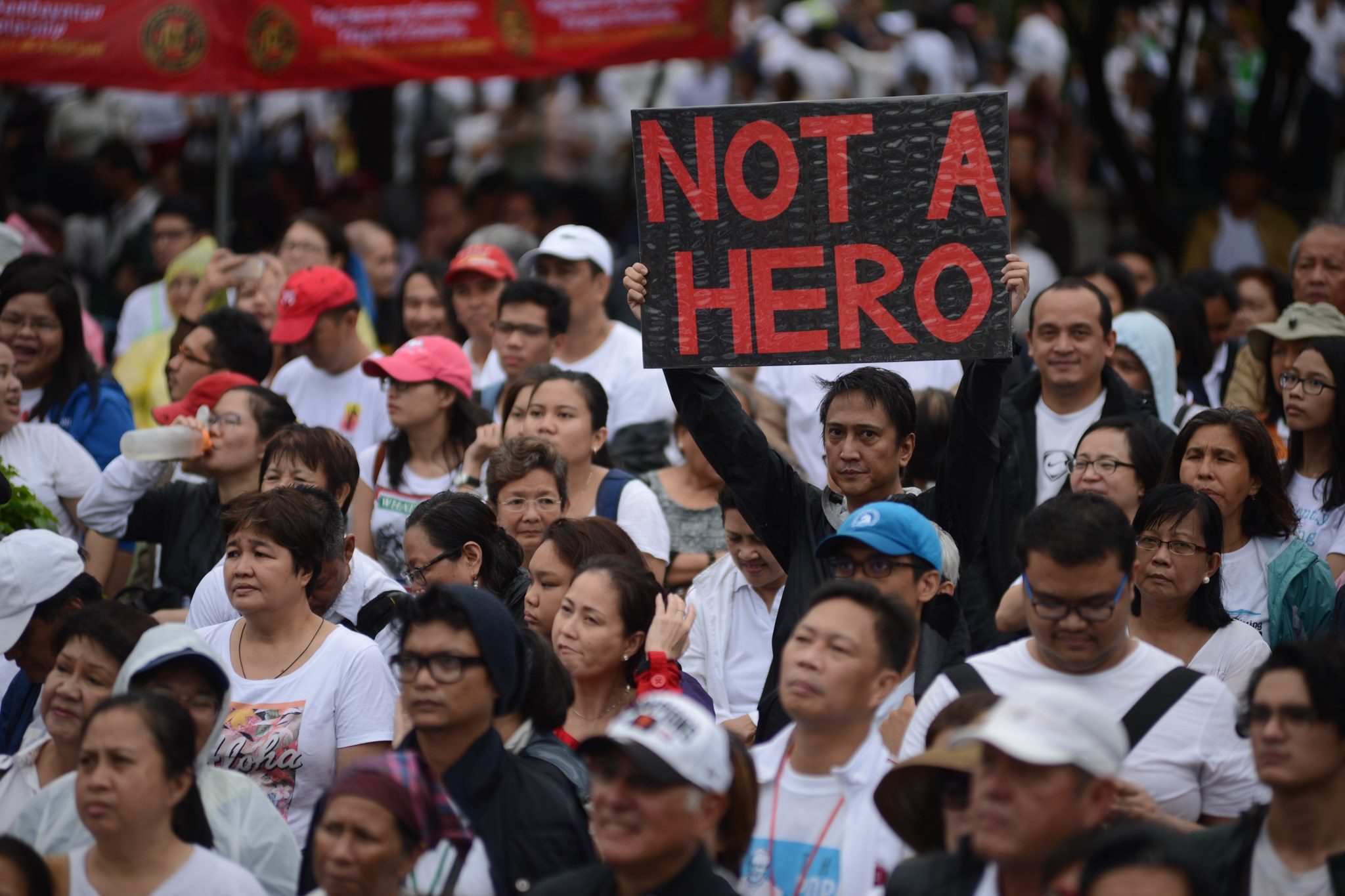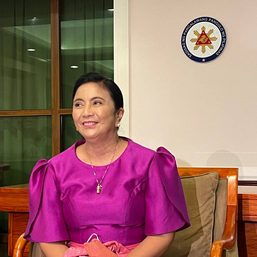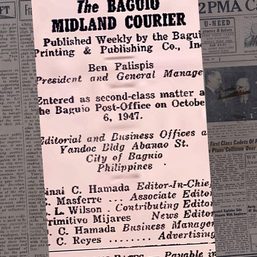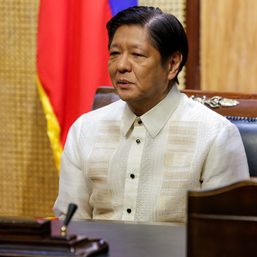SUMMARY
This is AI generated summarization, which may have errors. For context, always refer to the full article.

Thirty-five years after the Marcoses were thrown out of Malacañang by a popular revolt, the family has come close to rehabilitating itself. Call it historical revisionism or reputation management: They were able to take their name out of the gutter and give it a new sheen.
Outside of their base in Ilocos, the young Marcoses have slithered their way to national posts. Ferdinand “Bongbong” Marcos Jr won a Senate seat in 2010 while his sister, Imee, is serving her first term as senator.
Bongbong Marcos aimed higher but narrowly lost his bid for the vice-presidency in 2016. Today, he is running for president and early polls show him to be among the leading candidates.
At first, the Marcos appeal seems puzzling. How can that name have such a pull after all that the late dictator has done to us? Ferdinand Marcos stole about $10 billion from the public coffers, sent thousands to jail and their deaths during the Martial-Law years, and stunted our economy.
History textbooks
Here are three answers. By no means do these give a complete explanation of the near-successful laundering of the Marcos image – but they give us an idea why we got to where we are.
First, high school and college textbooks do not thoroughly discuss the Marcos years, what happened during Martial Law and the excesses of that dark period. Some millennials say they were not taught about martial law at all! I was utterly surprised to learn this.
Cielito Habito, an economics professor, cited the findings of Antonio Calipjo Go, an academic who has been documenting errors in our textbooks in a recent column for the Inquirer. For example, in one textbook, the bulk of the 18 pages on “Batas Militar” (Martial Law) is devoted to the positive effects of the dictatorship, while only two and a half pages dealt with the negative consequences of Martial Law. “Go found that other textbooks either glossed over it, or never mentioned it at all,” Habito wrote.
The Philippines has a lot to learn from Germany. Standard German history texts chronicle the rise of Hitler to power in 1933 up to the Holocaust. “It is a course… that challenges Germany’s young to come to terms with the burden of a collective past far more cruel and destructive than teen-agers anywhere else in the world are obliged to contemplate,” the New York Times reported.
In interviews with students, the New York Times found that “while many young Germans sense no personal guilt for a past generation’s crimes, they feel a responsibility to thwart any revival of their history’s racism, anti-Semitism, militarism and nationalism.”
This is what our past governments have neglected, helping shape the history curriculum of our schools. History, after all, should live in us.
YouTube, Tiktok
Second, the Marcoses have cleverly used social media and other means to scrub their reputation. I spoke to writer and historian Manuel “Manolo” Quezon III who has followed the Marcoses closely. He said that the new generation of Filipinos has been reached by the Marcoses through videos on YouTube and, later, Tiktok.
YouTube is a haven for disinformation. In April 2021, Rappler reported that “lies about the wealth of the family of the late dictator continue to spread on YouTube without labels or warnings. This happens even though the claims have been previously fact-checked and historians denounce them as fallacy.” Moreover, YouTube’s “Community Guidelines do not explicitly prohibit spreading false information.”
After Bongbong Marcos lost in 2016, Quezon observed that “the Marcoses kept up the innovation, conquered Tiktok, mastered…Twitter, making them top of mind, reinforcing them as the unstoppable family, the one to beat.”
Imee has also been actively involved with game developers, Quezon said, investing in development of apps. Apart from that, in what appears to be an innocuous move, writing exercise books for children in some provinces include the sentence, “Marcos is the greatest president of the Philippines.” Imagine children writing this sentence and absorbing it in their young minds. Quezon said he was shown a copy of the book.
Celebrities
Third, there’s a shift that has taken place and we may not have noticed it. Quezon pointed out that the Marcoses are not just of the political realm. They have crossed over to the cultural sphere, “removing their political baggage and creating a whole new image,” especially Imelda who has become an entertainment figure. A millennial told Quezon that, to their generation, Imelda is a celebrity, not a political figure.
This is dangerous because seeing the Marcoses through this lens takes out their past, the sins they have committed against the Filipino people. If this were a painting, it is as if their images were transferred into a new canvas, all gleam and sparkle, leaving out the black and horrid backdrop.
I invite you to watch the full interview with Quezon:

If there’s one bright spot, Quezon said that the Marcoses have not really achieved vindication because many people do remember and stop them in their tracks. After all, the project of rehabilitating themselves has been happening for about a decade.
Let’s hope that the 2022 election will seal their failed project.
Add a comment
How does this make you feel?
![[WATCH] In The Public Square with John Nery: Preloaded elections?](https://www.rappler.com/tachyon/2023/04/In-the-Public-Square-LS-SQ.jpg?resize=257%2C257&crop=414px%2C0px%2C1080px%2C1080px)
![[Newspoint] 19 million reasons](https://www.rappler.com/tachyon/2022/12/Newspoint-19-million-reasons-December-31-2022.jpg?resize=257%2C257&crop=181px%2C0px%2C900px%2C900px)

![[OPINION] The long revolution: Voices from the ground](https://www.rappler.com/tachyon/2022/06/Long-revolution-June-30-2022.jpg?resize=257%2C257&crop=239px%2C0px%2C720px%2C720px)
![[OPINION] I was called a ‘terrorist supporter’ while observing the Philippine elections](https://www.rappler.com/tachyon/2022/06/RT-poster-blurred.jpeg?resize=257%2C257&crop_strategy=attention)
![[Newspoint] Improbable vote](https://www.rappler.com/tachyon/2023/03/Newspoint-improbable-vote-March-24-2023.jpg?resize=257%2C257&crop=339px%2C0px%2C720px%2C720px)







![[New School] Tama na kayo](https://www.rappler.com/tachyon/2024/02/new-school-tama-na-kayo-feb-6-2024.jpg?resize=257%2C257&crop=290px%2C0px%2C720px%2C720px)
![[In This Economy] Marcos’ POGO ban is popular, but will it work?](https://www.rappler.com/tachyon/2024/07/thought-leaders-marcos-pogo-ban.jpg?resize=257%2C257&crop=255px%2C0px%2C720px%2C720px)
![[Rappler Investigates] POGOs no-go as Typhoon Carina exits](https://www.rappler.com/tachyon/2024/07/newsletter-graphics-carina-pogo.jpg?resize=257%2C257&crop=424px%2C0px%2C1080px%2C1080px)






![[OPINION] If it’s Tuesday it must be Belgium – travels make over the Marcos image](https://www.rappler.com/tachyon/2024/04/tl-travel-makeovers-marcos-image.jpg?resize=257%2C257&crop_strategy=attention)


![[OPINION] Raised on radio](https://www.rappler.com/tachyon/2024/04/raised-on-radio.jpg?resize=257%2C257&crop=396px%2C0px%2C720px%2C720px)
![[Just Saying] Marcos: A flat response, a missed opportunity](https://www.rappler.com/tachyon/2024/04/tl-marcos-flat-response-april-16-2024.jpg?resize=257%2C257&crop=277px%2C0px%2C720px%2C720px)


There are no comments yet. Add your comment to start the conversation.